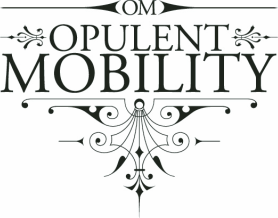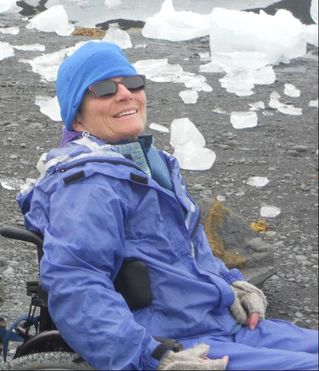Liebe Gray
Longing For Alaska © 1990 Liebe Gray
*FOR PERSONAL USE ONLY*
This is another kind of coming-out story, or maybe coming-up story. For a long time it was invisible, most of the time. A hidden malady. I used to worry about who to tell and what to tell. But to everything there is a season and summer can be an enervating time. Heat can be a lonely thing. My legs long for Alaska. My heart longs for my legs.
In May 1990 I staggered across a terrible endless parking lot, willed my way across Alameda to Olvera Street, the center of Mexican kitsch in L.A. I lurched past five guys in straw cowboy hats and onto the street, to the candle store where they had a bucket of “old men” canes--por los viejitos—I’d seen before and laughed at. But those canes were carved and painted and not at all prosthetic looking. I leaned on the counter clutching one, “I need this.” Armed with this too-tall stick, I struggled back to my car and then home.
Now it’s a different world: how does one get Disabled parking? How does one accept needing it? How does one deal with people one barely knows asking “Hey, what’s amatter with your leg?” “It’s my summer look.” “I forgot how to walk.” “It’s neurological.” “Yeah, but what’s amatter with your leg?” It’s the matter with my brain.
Y’know, the people I like the best, are the ones who say “Hey, that’s a neat cane.” There’s support in that. A kind of implied complicity.
But, you know, the ones to tell, the ones who can relate to it in some way? Musicians. String players. Cellists. I gave a ride to an eighty-year-old player, a delightful Englishwoman who still did chamber music, operas in restaurants, and was just now getting into theater. I came out to her in the car, and my new friend smiled and cried at the same time and flooded the car with her fond memories of this vivacious, passionate young cellist: Jacqueline Du Pre. Hey Jackie, I wish I’d known you. I’d heard, I vaguely remembered, when we were in our mid-twenties you were a monster on the classical scene, had been for years, and one night you picked up your spruce-topped soul and your fingers couldn’t feel the strings. You pulled off a concerto by grit and visual memory, and never played publicly again. Fifteen years later you died. Jackie, hey, whatcha doin’ now? People aren’t supposed to die from MS.
My friend Greg found me suspended one day in front of the library, a hundred and thirteen pounds battling gravity with a colorful cane.
I want to cry for beauty like a releasing punch in the chest, not these strangled-throat-behind-the-eyes tears for daily life. I want to cry for the sonorous complexity of Bach for cello alone; cry for the great blue heron allowing me to drift close before lifting from the water to glide away. Lately it’s been too many personal and San Andreas aftershocks, and not being able to stand after reaching the shore.
I found the local librarian closet cellist. She never saw you play, never heard you ‘til after you stopped, but oh…..she sent me home with a CD re-mastered Dvorak. I played it on my birthday. I imagined you cradling your instrument, feeling its resonance against your body and being driven by the power of a herd of bull fiddles and Slavic narrative folklines; and I was lying on my blanket under Tanglewood stars in the rain with tequila and mescaline letting the orchestra wash me clean. Jackie, you’re on the night shift now, and I’m still hanging on to my day gig.
But hey, it’s a new decade. New Year’s Day I liberated a cobalt blue wheelchair from the AIDS Project and went to the zoo. I downhilled it to the meerkats, those too-cute South African sentinels. I slalomed through families, risking life and popcorn, past the Peruvian penguins and the forever dozing crocodiles, coming to rest with the polar bears. He’s practicing water polo with a beer keg; she’s studying her claws.
I pushed over to Wolf Woods—oh, dogs of my heart. But one of them is missing. I backed out of the throng and slipped down the side road along the chain link fence. There she is: throwing down laps on her well-worn dead-end track. A big-boned wolf from southern Alaska. She climbs the hill; there’s a small tree, the fence, then me. I can hear her breath, look into her yellow eyes. Oh, dog of my dreams, I’m sorry you have to be here. I imagine us, our movement no longer impeded, restricted, confined. I imagine us playing, singing even in the dead of night to the reverberant hills. AHROOOOOooaarr……..
*FOR PERSONAL USE ONLY*
This is another kind of coming-out story, or maybe coming-up story. For a long time it was invisible, most of the time. A hidden malady. I used to worry about who to tell and what to tell. But to everything there is a season and summer can be an enervating time. Heat can be a lonely thing. My legs long for Alaska. My heart longs for my legs.
In May 1990 I staggered across a terrible endless parking lot, willed my way across Alameda to Olvera Street, the center of Mexican kitsch in L.A. I lurched past five guys in straw cowboy hats and onto the street, to the candle store where they had a bucket of “old men” canes--por los viejitos—I’d seen before and laughed at. But those canes were carved and painted and not at all prosthetic looking. I leaned on the counter clutching one, “I need this.” Armed with this too-tall stick, I struggled back to my car and then home.
Now it’s a different world: how does one get Disabled parking? How does one accept needing it? How does one deal with people one barely knows asking “Hey, what’s amatter with your leg?” “It’s my summer look.” “I forgot how to walk.” “It’s neurological.” “Yeah, but what’s amatter with your leg?” It’s the matter with my brain.
Y’know, the people I like the best, are the ones who say “Hey, that’s a neat cane.” There’s support in that. A kind of implied complicity.
But, you know, the ones to tell, the ones who can relate to it in some way? Musicians. String players. Cellists. I gave a ride to an eighty-year-old player, a delightful Englishwoman who still did chamber music, operas in restaurants, and was just now getting into theater. I came out to her in the car, and my new friend smiled and cried at the same time and flooded the car with her fond memories of this vivacious, passionate young cellist: Jacqueline Du Pre. Hey Jackie, I wish I’d known you. I’d heard, I vaguely remembered, when we were in our mid-twenties you were a monster on the classical scene, had been for years, and one night you picked up your spruce-topped soul and your fingers couldn’t feel the strings. You pulled off a concerto by grit and visual memory, and never played publicly again. Fifteen years later you died. Jackie, hey, whatcha doin’ now? People aren’t supposed to die from MS.
My friend Greg found me suspended one day in front of the library, a hundred and thirteen pounds battling gravity with a colorful cane.
I want to cry for beauty like a releasing punch in the chest, not these strangled-throat-behind-the-eyes tears for daily life. I want to cry for the sonorous complexity of Bach for cello alone; cry for the great blue heron allowing me to drift close before lifting from the water to glide away. Lately it’s been too many personal and San Andreas aftershocks, and not being able to stand after reaching the shore.
I found the local librarian closet cellist. She never saw you play, never heard you ‘til after you stopped, but oh…..she sent me home with a CD re-mastered Dvorak. I played it on my birthday. I imagined you cradling your instrument, feeling its resonance against your body and being driven by the power of a herd of bull fiddles and Slavic narrative folklines; and I was lying on my blanket under Tanglewood stars in the rain with tequila and mescaline letting the orchestra wash me clean. Jackie, you’re on the night shift now, and I’m still hanging on to my day gig.
But hey, it’s a new decade. New Year’s Day I liberated a cobalt blue wheelchair from the AIDS Project and went to the zoo. I downhilled it to the meerkats, those too-cute South African sentinels. I slalomed through families, risking life and popcorn, past the Peruvian penguins and the forever dozing crocodiles, coming to rest with the polar bears. He’s practicing water polo with a beer keg; she’s studying her claws.
I pushed over to Wolf Woods—oh, dogs of my heart. But one of them is missing. I backed out of the throng and slipped down the side road along the chain link fence. There she is: throwing down laps on her well-worn dead-end track. A big-boned wolf from southern Alaska. She climbs the hill; there’s a small tree, the fence, then me. I can hear her breath, look into her yellow eyes. Oh, dog of my dreams, I’m sorry you have to be here. I imagine us, our movement no longer impeded, restricted, confined. I imagine us playing, singing even in the dead of night to the reverberant hills. AHROOOOOooaarr……..
PHOTO DESCRIPTION:
A pale skinned woman in a bright blue cap, darker blue winter coat, grey gloves, and dark sunglasses sits in her wheelchair in front of a field of ice.
DONATE via Fractured Atlas!

Opulent Mobility by A. Laura Brody is licensed under a Creative Commons Attribution-ShareAlike 4.0 International License
The Opulent Mobility license refers to the exhibit and its audio descriptions. Individual artworks are the property of the individual artists.


